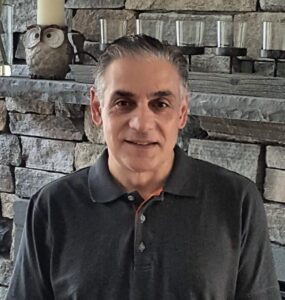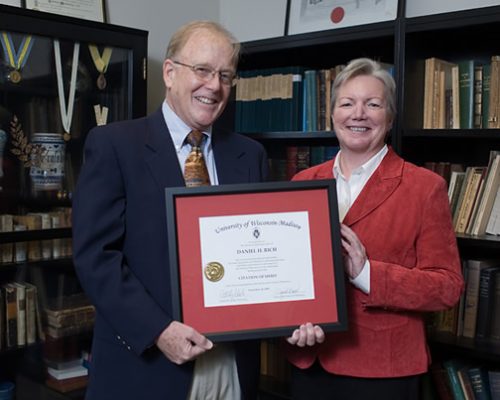The legacy of Professor Emeritus Dan Rich lives on at the School and in prolific alumni careers
By Iseult Gillespie
“At the time I was in graduate school there were famous professors known for abusive and sexist behaviors. Dan embodied the opposite. He cared about the quality of the work you were doing, not whether you were a woman or what the color of your skin was or how many hours you spent in the lab.”
Amy Ripka recalls her time as a graduate student in the lab of Daniel Rich, professor emeritus and former dean of research and graduate studies at the University of Wisconsin–Madison School of Pharmacy. Over the course of his distinguished career, Rich performed pioneering research at the chemistry-biology interface, published over 250 articles, and trained 36 PhD students along with another 100 postdoctoral students.

Many of Rich’s former students now occupy prominent positions in the pharmaceutical industry. Ripka, who pursued a PhD in chemistry under Rich’s mentorship, is the founder and CEO of the biotechnology firm Lucy Therapeutics. “If you were dedicated and produced high-quality work, Dan provided both support and respect for what you were doing,” she says.
“From 1940 on, we’ve seen an incredible revolution in science,” says Rich. He is widely recognized as a crucial player in that revolution — and has numerous accolades to show for it.
He is the recipient of the 1990 Vincent du Vigneaud Award in Peptide Chemistry, the 1992 Research Achievement Award from the American Association of Pharmaceutical Scientists, the 1992 George Herbert Hitchings Award for Innovative Methods in the Design and Discovery of Drugs, an Arthur C. Cope Scholar Award from the American Chemical Society in 1999, and the R. Bruce Merrifield Award from the American Peptide Society in 1999, among many others. In 2008, he received the School of Pharmacy’s Citation of Merit Award for his significant contributions to research and education.
“He cared about the quality of the work you were doing, not whether you were a woman or what the color of your skin was or how many hours you spent in the lab.”
—Amy Ripka
As a professor in the School’s Pharmaceutical Sciences Division, he created an environment in which students’ ideas could flourish. In the laboratory, the classroom, and beyond, he encouraged students to pursue their own projects: “I wasn’t going to squelch anything – I wanted people’s ideas,” he says.
“He rarely told us specifically what we had to do,” says Francesco Salituro (PhD ‘84), another of Rich’s former students and the founder of Salituro MedChem Solutions. “Rather, he planted the seeds of ideas and had us run with them.” Today, these ideas continue to proliferate — thanks in part to Rich’s singular approach to interdisciplinary research, education, and mentorship.
Beginnings
Growing up in Minnesota, Rich became interested in chemistry through his love for photography and learning to develop photos as a child. In high school, Rich borrowed a Polaroid camera from a local pharmacist and family friend and gave a lecture to his class about the discovery of the Polaroid film technique. “By then, I knew that I really loved chemistry and photography,” he says.
He pursued chemistry at the University of Minnesota and received his bachelor’s degree in 1964. After earning his PhD in organic chemistry in 1967 from Cornell University, he held postdoctoral appointments at Cornell and Stanford University.
Rich worked briefly at Dow Chemical, but found “a way to do what I really wanted to do” when he was offered a job at the UW–Madison School of Pharmacy in 1970.
A pioneer in chemical biology
At the School of Pharmacy, Rich was grateful to be able to pursue his unique research interests.
“I was very interested in the biological applications of chemistry,” he says. “In 1970, organic chemists didn’t do biology. But I wanted to combine both.” This combination of chemistry and biology was striking, at a time when cross-disciplinary methods were relatively uncommon.

At the School of Pharmacy, Rich found the freedom to pursue these methods. “We did it in my lab and in collaboration with others, and that’s where it all started,” he says.
In one of his most significant projects at the School of Pharmacy, Rich worked on the development of inhibitors of aspartic proteases, a type of enzyme, to create new antihypertensive agents for drug development. After being rejected by 14 pharmaceutical companies, Rich obtained grants from the pharmaceutical company Merck and the National Institutes of Health to develop a powerful class of antihypertensive agents.
In addition to inhibiting hypertension, these agents were found to inhibit HIV protease and were used by pharmaceutical companies in the development of the first treatments for the disease. Of the first six HIV protease inhibitors approved for treating AIDS in humans, Rich’s former student Roger Tung (PhD ‘87) is a named patent inventor of two, and a third was first described in a publication by Tung. “That is something I can sleep well on,” Rich says.
With this and other discoveries at the chemistry-biology interface, Rich is often credited with developing the field of chemical biology. He has long campaigned for increased awareness and funding for this research area. In 1992, he helped initiate the Chemistry-Biology Interface (CBI) Training Program at UW–Madison. The campus was one of the first five institutions to receive National Institutes of Health funding for this program, which continues to facilitate outstanding interdisciplinary work today, and a long line of the School’s students have been selected for the competitive training.
Life in the lab
Rich’s students encountered “the whole spectrum of science,” says Salituro. “The curriculum that Dan and the other professors in the School had put together was incredible.”
Rich describes himself as “very, very lucky” to have attracted students who were interested in combining different scientific methods. “I was extremely lucky to have outstanding graduate students to work with on my research. In the early days, before I became known, they came to my lab because Wisconsin was a great school. I was lucky to get them to work with me.”
In Rich Lab, students were trained to work together and exchange their ideas. But Rich also made sure that each of them followed their own unique research path. “I would try to set it up so they would work in an area where no one else in the world was working,” he says.

As a mentor, Rich is meticulous. “It was important to him that his students not only learned the facts, but how to apply them to new problems,” Salituro recalls. “Having a complete understanding of what we were doing and why was very important; it wasn’t just about making a series of peptide molecules.”
Tung, a 2018 Citation of Merit winner, also recalls the rigorous environment of the lab — and the detailed nature of Rich’s instruction.
“In my first year in his lab I used a chemical reagent with a complex name — bis(2-oxo-3-oxazolidinyl)phosphinic chloride — and stumbled when I said it during a meeting. Dan told me to practice saying it, over and over, until it rolled off my tongue,” says Tung. “Which I did! What he told me, and what I’ve found to be true, is that scientists will be judged by evidence of complete mastery of the details of their work, as well as their presentation of it.” Tung is now the CEO of Concert Pharmaceuticals, which is currently developing treatments for alopecia areata and schizophrenia.
In the long term, Rich’s mentorship has had a significant impact on his students’ careers. For instance, Ripka recalls that Rich gave her the chance to work with molecular modelers in the pharmaceutical company Ciba Geigy.
“It opened my eyes to the industry,” she says. Her company, Lucy Therapeutics, focuses on small molecule treatments for Rett syndrome and Parkinson’s disease.
Rich emphasizes the importance of being well-versed in the language of both the lab and the industry to his students. “They knew the whole spectrum: They knew about drug delivery, about biology, and they would walk into pharmaceutical companies and find that they could talk to everybody.”
Guiding new generations
Since his retirement in 2006, Rich has found time for travelling with his family, and has returned to his early love of photography. His legacy lives on to continue to guide future research at the School of Pharmacy. The Daniel H. and Jane L. Rich Graduate Student Support Fund was established in 2006 to aid underrepresented students pursuing a career in pharmaceutical sciences, which has provided vital support to many budding researchers through the years.
“I wanted to give back to the School of Pharmacy for giving me the opportunity to teach and do research at a first-rate university,” says Rich. “I also wanted to see the School recruit really bright, talented students. And they have been pulling in superb people.”
Over the years, many School of Pharmacy students and alumni have contributed to the fund, and currently, Tung and Salituro are leading a dollar-for-dollar match to expand the fund to create a graduate student fellowship.
“He planted the seeds of ideas and had us run with them.”
— Francesco Salituro
“My hope is that the Dan Rich fund will take the edge off for some highly qualified students that don’t come from wealthy families,” says Tung. “I see it as win-win for both the student and for the School, which gains more flexibility to offer assistance to its best prospects.” For Salituro, contributing to the scholarship fund offers the chance to “pay it forward to others for the tremendous experiences and opportunities that I had.”
Since the commencement of the scholarship fund, Rich has returned to the School to meet the recipients of the scholarship. He has also continued to keep in touch with former students and follow their careers.
In fall 2019, Tung and Salituro hosted an alumni event and celebration of Rich’s career in Boston.
“This is someone who really cares about people and who continued to follow their lives and careers from a distance,” says Salituro. “Beyond the career successes, people in Dan’s lab have formed friendships that have lasted for decades.”